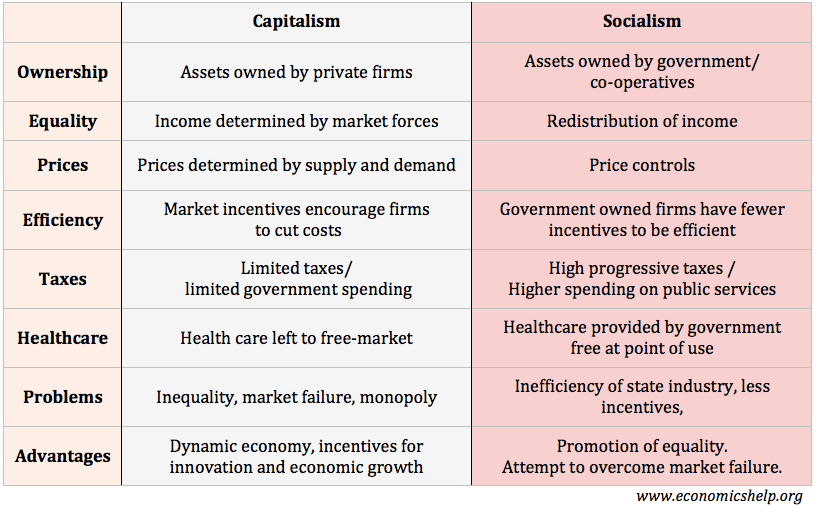The main difference between capitalism and socialism is the extent of government intervention in the economy.
A capitalist economic system is characterised by private ownership of assets and business. A capitalist economy relies on free-markets to determine, price, incomes, wealth and distribution of goods.
A socialist economic system is characterised by greater government intervention to re-allocate resources in a more egalitarian way.
There are also different aims of the economic systems.
Equality
- Capitalism is unconcerned about equity. It is argued that inequality is essential to encourage innovation and economic development.
- Socialism is concerned with redistributing resources from the rich to the poor. This is to ensure everyone has both equal opportunities and in some forms of socialism – equal outcomes.
Ownership
- Capitalism – Private businesses will be owned by private individuals/companies
- Socialism – The state will own and control the main means of production. In some models of socialism, ownership would not be by the government but worker co-operatives.
Efficiency
- Capitalism. It is argued that the profit incentive encourages firms to be more efficient, cut costs and innovate new products that people want. If firms fail to keep up, they will go out of business. But, this business failure allows resources to flow to new more efficient areas of the economy. Something known as ‘creative destruction’
- Socialism. It is argued that state ownership often leads to inefficiency because workers and managers lack any real incentive to cut costs. One joke under Soviet Communism was ‘They pretend to pay us. We pretend to work.’
Unemployment
- In capitalist economic systems, the state doesn’t directly provide jobs. Therefore in times of recession, unemployment in capitalist economic systems can rise to very high levels, e.g. 20% + in Great Depression
- Employment is often directed by the state. Therefore, the state can provide full employment even if workers are not doing anything particularly essential. Socialism is sometimes associated with Keynesian demand-management – attempts to stimulate the economy in times of slump. Keynes himself was not a socialist.
Price controls
- Prices are determined by market forces. Firms with monopoly power may be able to exploit their position and charge much higher prices.
- In a state-managed economy, prices are usually set by the government this can lead to shortages and surpluses.
Evaluation
There are many different forms of ‘socialism’ from totalitarian ‘Communist regimes’ To democratic socialist parties in Western Europe, who pursue a pragmatic form of redistribution – aiming for equality of opportunity rather than equality of outcome.
Pragmatic socialism
Some forms of socialism, adopt a more pragmatic approach. Many industries are left in private hands – a recognition free-markets are more efficient in producing goods. However, the socialist society attempts to use progressive taxation and social spending to provide a minimum safety net. Important public services are run directly by the government.
Responsible capitalism
Many ‘advanced capitalist societies’ have considerable government intervention. The government may provide unemployment benefits and public spending on infrastructure, healthcare and education.
Related
- Different types of capitalism – turbo-capitalism, state capitalism, popular capitalism, responsible capitalism
- Mixed Economy
- Different types of socialism
Published 28 Oct 2018, Tejvan Pettinger. www.economicshelp.org

